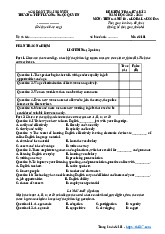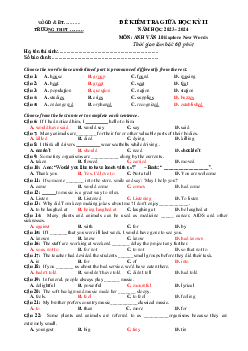
















Preview text:
….………… HIGH SCHOOL MID-TERM TEST 2 SCORE CLASS: 10… Time: 45 minutes
NAME: ………………………………………. Code: 10
I. Choose the word whose underlined part is pronounced differently.
1. A. distract B. tablet C. backpack D. debate
2. A. decoy B. educate C. concord D. decrease
3. A. expensive B. encounter C. excellent D. encourage
II. Choose the word that has a different stressed syllable from the rest.
4. A. remember B. embarrass C. disappoint D. defining
5. A. Internet B. creative C. portable D. benefit
III. Choose the best option (A, B, C or D) to complete each of the following sentences.
6. Gender equality ________ only when women and men enjoy the same opportunities.
A. will achieve B. achieves C. achieve D. will be achieved
7. Women are more likely to be victims of _________ violence.
A. domestic B. household C. home D. family
8. In Yemen, women have less ____ to property ownership, credit, training and employment
A. possibility B. way C. use D. access
9. In Korea, many people still feel that women should be in charge of ________ after getting married.
A. housekeeping B. homemaker C. house husband D. householder
10. Superstitions _________ an important part in the lives of many people in Viet Nam.
A. take B. act C. occupy D. play
11. Traditionally, most Vietnamese people never ________ the floor during the first three days of the New Year.
A. sweep B. paint C. polish D. resurface
11. In the U.S, children can choose their own partners even if their parents object _________ their choice.
A. to B. for C. against D. with
12. They’re excellent learning __________. You can store information, take notes,
write essays and do calculations.
A. equipments B. tools C. gadgets D. techniques
13. In English class yesterday, we had a discussion ____________ different cultures.
A. around B. about C. for D. from
14. Mrs Dawson said that we were ___________ our lesson in the library next Monday.
A. having B. making C. reading D. going
15. I really don’t ___________ the point of taking the exam when you are not ready for it.
A. take B. have C. mind D. see
IV. Give the correct form of each word in the brackets.
16. On October 24, 1975, more than 25 thousand women in Iceland took a day off to
emphasize the importance of women's ____________ to the economy, both in paid and unpaid work. (CONTRIBUTE)
17. Gender equality is also a part of the _________ to the challenges facing society. (SOLVE)
18. The Intel programme tries to deliver the “four Cs” to grade-10 students: critical
thinking, communication, collaboration, and __________. (CREATE)
19. Many digital textbooks are ____________ updated and often more vivid, helpful,
creative, and a lot of cheaper than those old heavy books. (CONSTANT)
20. An interactive whiteboard is an __________ device that helps students learn
English in a more stimulating way. (ELECTRICITY)
V. Choose the word or phrase among A, B, C or D that best fits the blank space in the following passage. A POWERFUL INFLUENCE
There can be no doubt at all that the Internet has made a huge difference to our lives.
Parents are worried that children spend too much time playing on the Internet, hardly
(21) ________ doing anything else in their spare time. Naturally, parents are curious
to find out why the Internet is so attractive, and they want to know if it can be (22)
__________ for their children. Should parents be worried if their children are
spending that much time watching their computers?
Obviously, if the children are bent over their computers for hours, (23) ____ in some
game, instead of doing their homework, then something is wrong. Parents and
children could decide how much use the child should make of the Internet, and the
child should give his or her promise that it won't interfere with homework. If the child
is not (24) ____ to this arrangement, parents can take more drastic steps. Dealing with
a child's use of the Internet is not much different from negotiating any other sort of bargain about behavior.
Any parent who is seriously alarmed about a child's behavior should make an
appointment to discuss the matter with a teacher. Spending time in front of the screen
does not (25) ____ affect a child's performance at school. Even if the child is
absolutely crazy about using the Internet, he or she is probably just going through a
phase, and in a few months there will be something else to worry about!
21. A. always B. rarely C. never D. ever
22. A. harming B. harmful C. hurting D. hurtful
23. A. supposed B. occupied C. involved D. absorbed
24. A. holding B. sticking C. following D. accepting
25. A. possibly B. necessarily C. probably D. consequently
VI. Read the passage and choose the best answer.
For Catherine Lumby, deciding to take on the role of breadwinner in her relationship
was not a difficult choice. When she discovered she was pregnant with her first child,
she had just been offered a demanding new role as Director of the Media and
Communications department at the University of Sydney. But she didn't see this as an
obstacle and was prepared to use childcare when the children were old enough. It
came, therefore, as a surprise to Lumby and her husband Derek that, after the birth of
their son, they couldn’t actually bear the thought of putting him into childcare for nine
hours a day. As she was the one with the secure job, the role of primary care-giver fell
to Derek, who was writing scripts for television. This arrangement continued for the
next four years, with Derek working from home and caring for both of their sons. He
returned to full-time work earlier this year.
Whilst Lumby and her husband are by no means the only Australians making such a
role reversal, research suggests that they are in the minority. In a government-funded
survey in 2001, only 5.5 percent of couples in the 30–54-year age group saw the
women working either part- or full-time while the men were unemployed.
The situation is likely to change, according to the CEO of Relationships Australia,
Anne Hollands. She suggests that this is due to several reasons, including the number
of highly educated women in the workforce and changing social patterns and
expectations. However, she warns that for couples involved in role-switching, there
are many potential difficulties to be overcome. For men whose self-esteem is
connected to their jobs and the income it provides to the family, a major change of
thinking is required. It also requires women to reassess, particularly with regard to
domestic or child-rearing decisions, and they may have to learn to deal with the guilt
of not always being there at key times for their children. Being aware of these issues
can make operating in non-traditional roles a lot easier.
26. What is the main idea of the passage?
A. Men being the bread winners B. Traditional roles of women
C. Women being the home makers D. Reversed roles between men and women
27. Catherine and her husband decided that Catherine would be the primary earner because __________.
A. she had a badly paid job B. she was not good at childcare
C. she had a reliable job D. she wanted her husband to stay at home
28. They decided that Derek would look after their son because they _____________.
A. couldn’t afford to put their child in care for long periods each day
B. didn’t want to put their child in care for long periods each day
C. thought childcare was not safe enough for their children
D. worried about their son’s health problems
29. In paragraph 2, the word “reversal" is closest in meaning to _____________.
A. stability B. modification C. rehearsal D. switch
30. One reason for a change in the number of men staying home is _________.
A. the stability in the number of highly-educated women who are working
B. the fall in the number of highly-educated women who are working
C. the rise in the number of highly-educated women who are working
D. the fluctuation in the number of highly-educated women who are working
VII. Complete the second sentence with the same meaning to the first one.
31. They will sue the company for wage discrimination. (sued)
=> The company ______________________________.
32. There were fewer occasions for giving gifts in the past than those in modern societies. (more)
=> There are _________________________________.
33. Nothing is more precious than happiness and health. (most)
=> Happiness and health _______________________.
34. Electronic devices are bad for your eyes. Their radiation is very harmful. (whose)
=> _________________________________________.
35. They may feel sad and bad about themselves. This might affect their performance at school. (which)
=> _________________________________________.
VIII. Listen and fill in each blank with NO MORE THAN THREE WORDS.
36. It’s a sign of bad luck if black cats walk _________ you or you step on their tails.
37. The superstition about black cats dates back to the _________ when they became
associated with witches and evil spirits.
38. The early Egyptians believed that the shape of the Pyramids had a __________.
39. It was considered very bad luck to break the “power” of the pyramid shape by walking __________!
40. In addition, in Roman times, people believed that their reflections in
____________were in fact “glimpses of the soul”.
---------------------THE END--------------------- ĐÁP ÁN ĐỀ THI 1. D
Kiến thức: Phát âm “a” Giải thích: A. distract /dɪˈstrækt/ B. tablet /ˈtæb.lət/ C. backpack /ˈbæk.pæk/ D. debate /dɪˈbeɪt/
Phần được gạch chân ở phương án D được phát âm /ei/, các phương án còn lại phát âm /æ/ Chọn D 2. B
Kiến thức: Phát âm “d” Giải thích: A. decoy /ˈdiː.kɔɪ/ B. educate /ˈedʒ.u.keɪt/ C. concord /ˈkɒŋ.kɔːd/ D. decrease /dɪˈkriːs/
Phần được gạch chân ở phương án B được phát âm /ʒ/, các phương án còn lại phát âm /d/ Chọn B 3. C
Kiến thức: Phát âm “e” Giải thích: A. expensive /ɪkˈspen.sɪv/
B. encounter /ɪnˈkaʊn.tər/ C. excellent /ˈek.səl.ənt/
D. encourage /ɪnˈkʌr.ɪdʒ/
Phần được gạch chân ở phương án C được phát âm /e/, các phương án còn lại phát âm /i/ Chọn C 4. C
Kiến thức: Trọng âm Giải thích: A. remember /rɪˈmem.bər/ B. embarrass /ɪmˈbær.əs/
C. disappoint /ˌdɪs.əˈpɔɪnt/ D. defining /dɪˈfaɪ.nɪŋ/
Phương án C có trọng âm 3, các phương án còn lại có trọng âm 2. Chọn C 5. B
Kiến thức: Trọng âm Giải thích: A. Internet /ˈɪn.tə.net/ B. creative /kriˈeɪ.tɪv/
C. portable /ˈpɔː.tə.bəl/ D. benefit /ˈben.ɪ.fɪt/
Phương án B có trọng âm 2, các phương án còn lại có trọng âm 1. Chọn B 6. D
Kiến thức: Thể bị động Giải thích:
- Công thức chung của thể chủ động với động từ khiếm khuyết “will” (sẽ): S + will + Vo + O.
- Công thức chung của thể bị động với động từ khiếm khuyết “will” (sẽ): S + will + be + V3/ed + (by O).
achieve – achieved – achieved (v): đạt được.
Gender equality will be achieved only when women and men enjoy the same opportunities. Chọn D 7. A
Kiến thức: Từ vựng Giải thích: A. domestic (a): trong nhà
B. household (n): hộ gia đình C. home (n): tổ ấm D. family (n): gia đình
Trước danh từ “violence” (bạo lực) cần một tính từ.
Cụm từ “domestic violence”: bạo lực gia đình
Women are more likely to be victims of domestic violence.
(Phụ nữ có nhiều khả năng trở thành nạn nhân của bạo lực gia đình.) Chọn A 8. D
Kiến thức: Từ vựng Giải thích:
A. possibility (n): khả năng B. way (n): cách C. use (n): sử dụng D. access (n): quyền
In Yemen, women have less access to property ownership, credit, training and employment.
(Ở Yemen, phụ nữ ít có quyền sở hữu tài sản, tín dụng, đào tạo và việc làm.) Chọn D 9. A
Kiến thức: Từ vựng Giải thích:
A. housekeeping (n): công việc quản gia
B. homemaker (n): người làm việc ở nhà
C. house husband (n): người chồng nội trợ
D. householder (n): chủ hộ
In Korea, many people still feel that women should be in charge
of housekeeping after getting married.
(Ở Hàn Quốc, nhiều người vẫn cảm thấy rằng phụ nữ nên phụ trách việc quản gia sau khi kết hôn.) Chọn A 10. D
Kiến thức: Từ vựng Giải thích: A. take (v): lấy B. act (v): hành động C. occupy (v): chiếm D. play (v): chơi
Cụm động từ: “play an important part”: đóng vai trò quan trọng
Superstitions play an important part in the lives of many people in Viet Nam.
(Mê tín đóng một phần quan trọng trong cuộc sống của nhiều người ở Việt Nam.) Chọn D 11. A
Kiến thức: Từ vựng Giải thích: A. sweep (v) quét B. paint (v) sơn C. polish v) đánh bóng
D. resurface (v) tái tạo bề mặt
Traditionally, most Vietnamese people never sweep the floor during the first three days of the New Year.
(Theo truyền thống, đa số người Việt Nam không bao giờ quét sàn nhà trong suốt ba
ngày đầu tiên của năm mới.) Chọn A 12. B
Kiến thức: Từ vựng Giải thích:
A. equipments (n): thiết bị B. tools (n): công cụ C. gadgets (n): tiện ích
D. techniques (n)L kĩ thuật
They’re excellent learning tools. You can store information, take notes, write essays and do calculations.
(Chúng quả là những công cụ học tập thông minh. Bạn có thể lưu trữ thông tin, ghi
chú, viết luận và tính toán.) Chọn B 13. B
Kiến thức: Giới từ Giải thích: A. around: quanh B. about: về C. for: cho D. from: từ
In English class yesterday, we had a discussion about different cultures.
(Trong lớp tiếng Anh ngày hôm qua, chúng tôi đã có một cuộc thảo luận về các nền văn hóa khác nhau.) Chọn B 14. A
Kiến thức: Từ vựng Giải thích: A. having (v): có B. making (v): làm C. reading (v): đọc D. going (v): đi
Mrs Dawson said that we were having our lesson in the library next Monday.
(Bà Dawson nói rằng chúng tôi sẽ học tiết học tại thư viện vào thứ Hai tới) Chọn A 15. D
Kiến thức: Từ vựng Giải thích: A. take (v): lấy B. have (v): có C. mind (v): bận tâm D. see (v): nhìn thấy
Cụm động từ: “see the point”: hiểu
I really don’t see the point of taking the exam when you are not ready for it.
(Tôi thực sự không thấy ý nghĩa của việc làm bài kiểm tra khi bạn chưa sẵn sàng cho nó.) Chọn D 16. contribution
Kiến thức: Từ vựng – Từ loại Giải thích:
Sau tính từ sở hữu “women’s” (của người phụ nữ) cần một danh từ contribute (v): đóng góp
=> contribution (n): sự đóng góp
On October 24, 1975, more than 25 thousand women in Iceland took a day off to
emphasize the importance of women's contribution to the economy, both in paid and unpaid work
(Vào ngày 24 tháng 10 năm 1975, hơn 25 nghìn phụ nữ ở Iceland đã nghỉ một ngày
để nhấn mạnh tầm quan trọng của sự đóng góp của phụ nữ vào nền kinh tế, cả trong
công việc được trả lương và không được trả lương) Đáp án: contribution 17. solution
Kiến thức: Từ vựng – Từ loại Giải thích:
Sau mạo từ “the” cần dùng một danh từ solve (v): giải quyết
=> solution (n): giải pháp
Gender equality is also a part of the solution to the challenges facing society.
(Bình đẳng giới cũng là một phần của giải pháp cho những thách thức mà xã hội đang phải đối mặt.) Đáp án: solution 18. creativeness
Kiến thức: Từ vựng – Từ loại Giải thích:
Trước “amd” (và) đang là danh từ “collaboration” (sự hợp tác) nên vị trí trống cũng cần một danh từ. create (v: tạo ra
=> creativeness (n): sự sáng tạo
The Intel programme tries to deliver the “four Cs” to grade-10 students: critical
thinking, communication, collaboration, and creativeness.
(Chương trình Intel cố gắng cung cấp “bốn chữ C” cho học sinh lớp 10: tư duy phản
biện, giao tiếp, hợp tác và sáng tạo.) Đáp án: creativeness 19. constantly
Kiến thức: Từ vựng – Từ loại Giải thích:
Trước động từ thường “updated” (cập nhật) cần một trạng từ. constant (a): liên tục
=> constantly (adv): một cách liên tục
Many digital textbooks are constantly updated and often more vivid, helpful, creative,
and a lot of cheaper than those old heavy books.
(Nhiều sách giáo khoa kỹ thuật số được cập nhật liên tục và thường sinh động hơn,
hữu ích hơn, sáng tạo hơn và rẻ hơn rất nhiều so với những cuốn sách cũ nặng nề.) Đáp án: constantly 20. electronic
Kiến thức: Từ vựng – Từ loại Giải thích:
Trước danh từ “device” (thiết bị) cần một tính từ electricity (n): điện
=> electronic (a): điện tử
An interactive whiteboard is an electronic device that helps students learn English in a more stimulating way.
(Bảng tương tác là một thiết bị điện tử giúp học sinh học tiếng Anh một cách hứng thú hơn.) Đáp án: electronic 21. D
Kiến thức: Từ vựng Giải thích: A. always: luôn luôn B. rarely: hiếm C. never: không bao giờ D. ever: bao giờ
Cụm từ: “hardly ever”: hầu như không bao giờ.
Parents are worried that children spend too much time playing on the Internet,
hardly ever doing anything else in their spare time.
(Cha mẹ lo lắng rằng trẻ em dành quá nhiều thời gian để chơi trên Internet, hầu như
không bao giờ làm bất cứ điều gì khác trong thời gian rảnh rỗi.) Chọn D 22. B
Kiến thức: Từ vựng Giải thích: A. harming (v): làm hại B. harmful (a): có hại
C. hurting (v): làm tổn thương
D. hurtful (a): tổn thương
Sau động từ tobe “be” cần một tính từ.
Naturally, parents are curious to find out why the Internet is so attractive, and they
want to know if it can be harmful for their children.
(Đương nhiên, các bậc cha mẹ tò mò muốn tìm hiểu tại sao Internet lại hấp dẫn đến
vậy và họ muốn biết liệu nó có thể gây hại cho con cái họ hay không.) Chọn B 23. D
Kiến thức: Từ vựng Giải thích: A. supposed (v): giả sử B. occupied (v): sử dụng C. involved (v): liên quan D. absorbed (v): hấp thụ
Cụm từ “absorb in”: mải mê
Obviously, if the children are bent over their computers for hours, absorbed in some
game, instead of doing their homework,
(Rõ ràng, nếu bọn trẻ cắm mặt vào máy tính hàng giờ, mải mê với một trò chơi nào đó,
thay vì làm bài tập về nhà,) Chọn D 24. A
Kiến thức: Từ vựng Giải thích: A. holding (v): giữ vững B. sticking (v): dính C. following (v): theo
D. accepting (v): chấp nhận
Cụm từ: “hold to something”: tuân theo cái gì đó
If the child is not holding to this arrangement, parents can take more drastic steps.
(Nếu đứa trẻ không tuân theo sự sắp xếp này, cha mẹ có thể thực hiện các bước quyết liệt hơn.) Chọn A 25. B
Kiến thức: Từ vựng Giải thích: A. possibly (adv): có thể
B. necessarily (adv): nhất thiết C. probably (adv): có lẽ
D. consequently (adv): hậu quả là
Spending time in front of the screen does not necessarily affect a child's performance at school.
(Dành thời gian trước màn hình không nhất thiết ảnh hưởng đến thành tích của trẻ ở trường.) Chọn B
Bài đọc hoàn chỉnh: A POWERFUL INFLUENCE
There can be no doubt at all that the Internet has made a huge difference to our lives.
Parents are worried that children spend too much time playing on the Internet, hardly
(21) ever doing anything else in their spare time. Naturally, parents are curious to find
out why the Internet is so attractive, and they want to know if it can be
(22) harmful for their children. Should parents be worried if their children are
spending that much time watching their computers?
Obviously, if the children are bent over their computers for hours, (23) absorbed in
some game, instead of doing their homework, then something is wrong. Parents and
children could decide how much use the child should make of the Internet, and the
child should give his or her promise that it won't interfere with homework. If the child
is not (24) holding to this arrangement, parents can take more drastic steps. Dealing
with a child's use of the Internet is not much different from negotiating any other sort of bargain about behavior.
Any parent who is seriously alarmed about a child's behavior should make an
appointment to discuss the matter with a teacher. Spending time in front of the screen
does not (25) necessarily affect a child's performance at school. Even if the child is
absolutely crazy about using the Internet, he or she is probably just going through a
phase, and in a few months there will be something else to worry about! Tạm dịch ẢNH HƯỞNG MẠNH MẼ
Không còn nghi ngờ gì nữa, Internet đã tạo ra sự khác biệt to lớn trong cuộc sống của
chúng ta. Các bậc cha mẹ lo lắng rằng trẻ em dành quá nhiều thời gian để chơi trên
Internet, (21) hầu như không làm bất cứ điều gì khác trong thời gian rảnh rỗi. Đương
nhiên, các bậc cha mẹ tò mò muốn tìm hiểu lý do tại sao Internet lại hấp dẫn đến vậy
và họ muốn biết liệu nó có thể (22) có hại cho con cái họ hay không. Cha mẹ có nên
lo lắng nếu con cái họ dành nhiều thời gian xem máy tính không?
Rõ ràng, nếu bọn trẻ cắm mặt vào máy tính hàng giờ, (23) mải mê với một trò chơi
nào đó, thay vì làm bài tập về nhà, thì có điều gì đó không ổn. Cha mẹ và con cái có
thể quyết định mức độ sử dụng Internet của đứa trẻ và đứa trẻ nên hứa rằng điều đó sẽ
không ảnh hưởng đến bài tập về nhà. Nếu đứa trẻ không (24) tuân theo sự sắp xếp
này, cha mẹ có thể thực hiện các bước quyết liệt hơn. Xử lý việc sử dụng Internet của
một đứa trẻ không khác nhiều so với việc đàm phán bất kỳ hình thức mặc cả nào khác về hành vi.
Bất kỳ phụ huynh nào lo lắng nghiêm trọng về hành vi của trẻ nên đặt lịch hẹn để thảo
luận vấn đề với giáo viên. Dành thời gian trước màn hình không (25) nhất thiết ảnh
hưởng đến hiệu suất của trẻ ở trường. Ngay cả khi đứa trẻ hoàn toàn thích sử dụng
Internet, thì có lẽ nó chỉ mới trải qua một giai đoạn, và trong vài tháng nữa sẽ có điều
gì đó khác phải lo lắng! 26. D
Kiến thức: Đọc hiểu Giải thích:
Ý chính của đoạn văn là gì?
A. Đàn ông là người trụ cột trong gia đình
B. Vai trò truyền thống của phụ nữ
C. Phụ nữ là người nội trợ
D. Vai trò đảo ngược giữa nam và nữ
Thông tin: Cả bài đọc đều nói về sự thay đổi vai trò của đàn ông và phụ nữ. Chọn D 27. C
Kiến thức: Đọc hiểu Giải thích:
Catherine và chồng quyết định rằng Catherine sẽ là người kiếm tiền chính vì __________.
A. cô ấy có một công việc được trả lương thấp
B. cô ấy không giỏi chăm sóc trẻ em
C. cô ấy có một công việc đáng tin cậy
D. cô ấy muốn chồng ở nhà
Thông tin: “As she was the one with the secure job, the role of primary care-giver fell
to Derek, who was writing scripts for television”
(Vì cô ấy là người có công việc đảm bảo nên vai trò người chăm sóc chính thuộc về
Derek, người đang viết kịch bản cho truyền hình.) Chọn C 28. B 29. D 30. C 31.
Đáp án: The company will be sued for wage discrimination.
(Công ty sẽ bị kiện vì phân biệt tiền lương.) 32.
Đáp án: There are more occasions for giving gifts in modern societies than in the past.
(Có nhiều dịp để tặng quà trong xã hội hiện đại hơn trong quá khứ.) 33.
Đáp án: Happiness and health are the most precious things. 34.
Đáp án: Electronic devices whose radiation is very harmful are bad for your eyes. 35.
They may feel sad and bad about themselves, which might affect their performance at school. 36. in front of 37. Middle Ages 38. special power 39. under a ladder 40. pools of water




